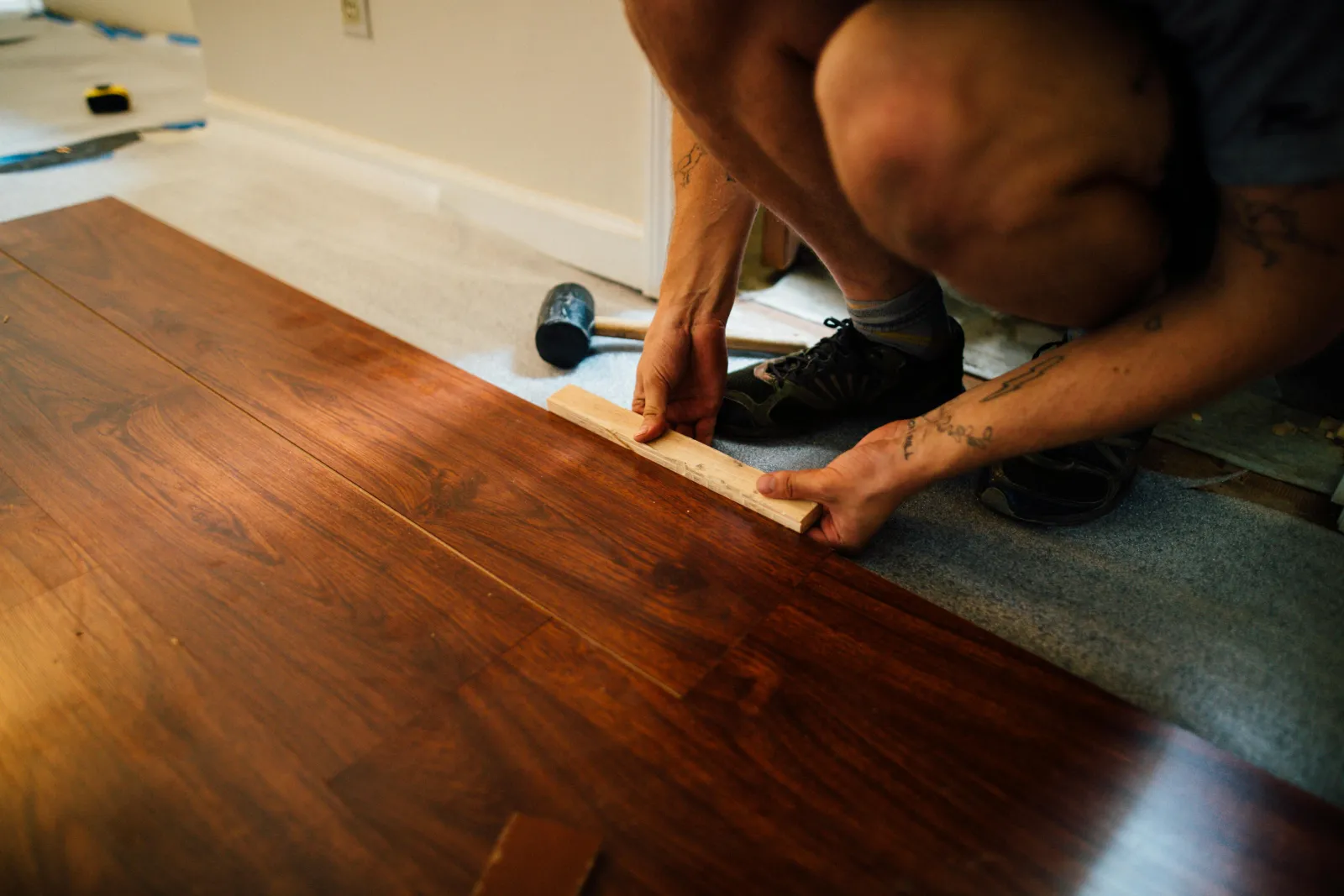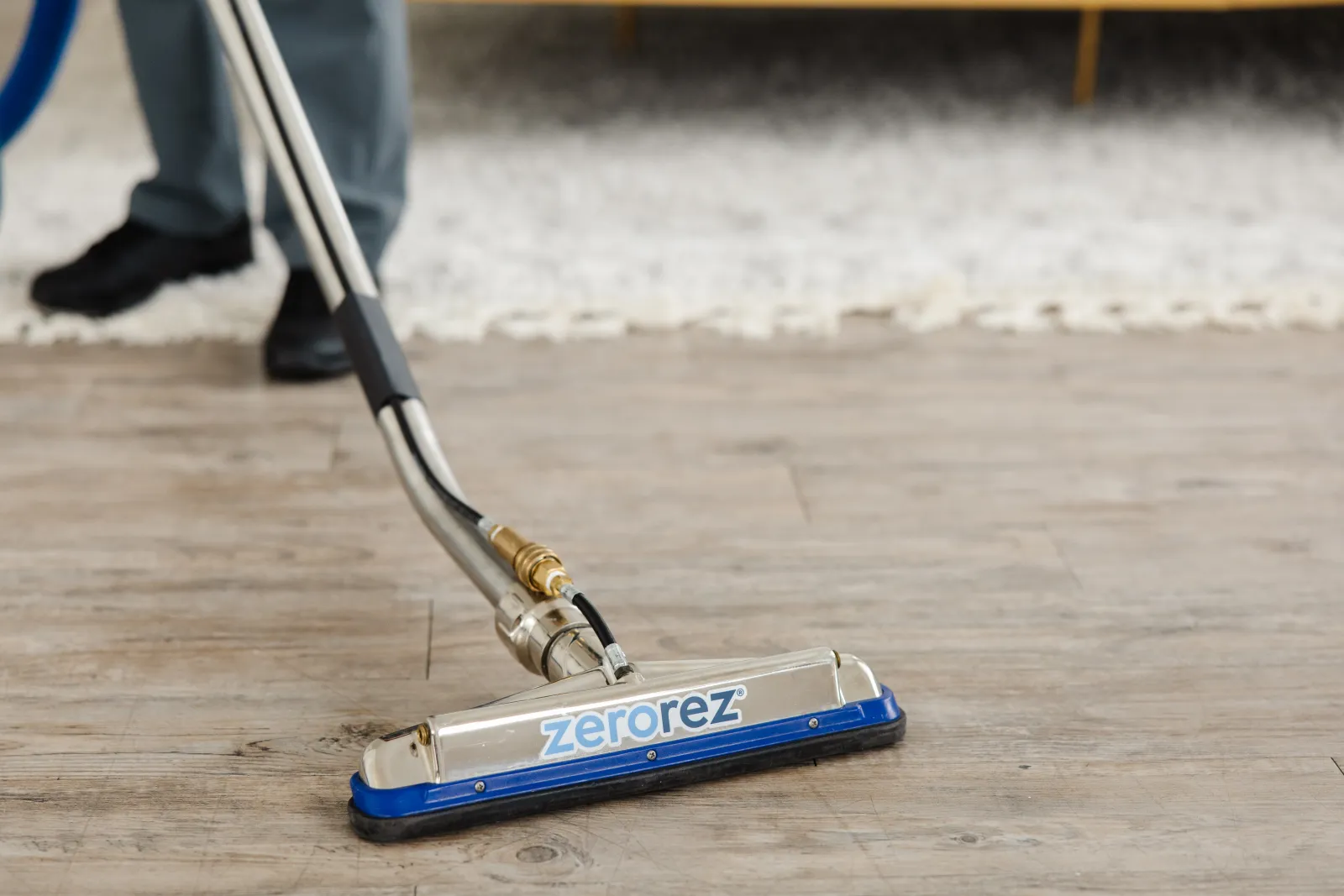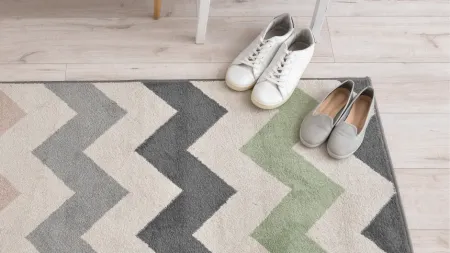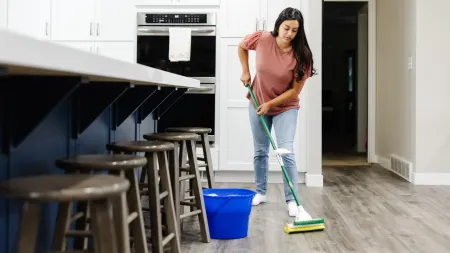Hardwood Flooring VS Laminate: Which is Better?
Hardwood flooring and laminate are easy to clean but vary in lifespan, price, and maintenance.
Hardwood flooring can last up to 100 years, while laminate flooring lasts between 15 and 25 years; hence, it is cheaper. Once damaged, laminate floors can't be refinished, but you can sand down and refinish hardwood floors. Laminate flooring is great for DIY installation, while hardwood flooring requires an expert.
These are some of the few differences between the two floorings.
Read our hardwood flooring vs. laminate flooring comparison guide to learn more about the differences and similarities. Whichever you choose, know that Zerorez® can professionally clean hardwood floors and professionally clean laminate floors!
What Is Laminated Flooring?
Laminate flooring is a synthetic floor resembling hardwood, stone, or wood. It is made of particleboard, the topping of which is an image layer and transparent wear layer.
Laminate is best for areas that don't experience excessive moisture, such as hallways, living rooms, bedrooms, and dining rooms. There are newer water-resistant or waterproof laminate flooring available though that can work in these spaces.
What Is Hardwood Flooring?
Hardwood or solid wood flooring is made of hardwood species such as walnut, maple, or oak. It has a long lifespan and can be sanded and refinished many times.
Solid wood flooring is best for hallways, bedrooms, dining rooms, kitchens, home offices, living rooms, and other areas that don't risk getting saturated with water, unlike laundry rooms.
Hardwood Flooring vs Laminate: What Are Their Differences, Similarities, Cons, and Pros?
Depending on various aspects, laminate and hardwood flooring may be the best choice for your home. Laminate flooring could be the best choice for a temporary, comfortable home on a low budget, while hardwood flooring is the best choice for a higher budget and long-term investment.
The downside of both hardwood and laminate flooring is that they are not resistant to moisture, so you must avoid saturating them with water or installing them in bathrooms, laundry rooms, and other potentially wet areas.
Hardwood flooring vs laminate flooring: Differences Characteristics Hardwood flooring Laminate flooring Lifespan Lasts up to 100 years Lasts for 15 to 25 years Cost Expensive Affordable Maintenance Can be resanded and refinished Shouldn't be resanded Appearance More attractive Less appealing Quality Pure solid wood Thin fiberboard with stone or wood image Installation Done by experts Great for DIYers Attachment to subfloor Fastened with staples or nails No fasteners
| Characteristics | Hardwood Flooring | Laminate Flooring |
|---|---|---|
| Lifespan | Lasts up to 100 years | Lasts for 15 to 25 years |
| Cost | Expensive | Affordable |
| Maintenance | Can be resanded and refinished | Shouldn't be resanded |
| Appearance & Quality | More attractive; Pure solid wood | Less appealing; Thin fiberboard with stone or wood image |
| Installation | Done by experts | Great for DIYers |
| Attachment to Subfloor | Fastened with staples or nails | No fasteners |
Lifespan: Hardwood vs. Laminate Flooring
Hardwood Flooring: Solid flooring is better for homeowners who want a long-term flooring investment. It's also great for real estate businesses because it adds value to a home. Under great care and maintenance, hardwood flooring can last up to 100 years or longer.
Laminate Flooring: Taking good care of laminated flooring could make it last up to 25 years.
Cost: Laminate vs. Hardwood Flooring
Hardwood Flooring: The cost difference between laminate and hardwood is huge. Common hardwood floorings like ash, oak, and maple are generally cheaper than unique hardwood species like Brazilian Cherry, Tigerwood, Walnut, and Mahogany. Costs for hardwood usually range between $4 and $8 per sq/ft.
Laminate Flooring: Laminated flooring costs around $1 to $3.50 per sq/ft for basic or mid-range laminate flooring. For high-end laminate flooring, costs are closer to $4 to $11 per square foot. The underlayment costs between $0.15 to $0.50 per square foot.
Care and Maintenance: Laminate Flooring vs. Hardwood
Hardwood Flooring: Hardwood flooring is easy to clean and care for; you only need to vacuum or sweep it twice weekly. Use a damp mop to clean hardwood flooring. You need to refinish or recoat hardwood periodically based on wear and tear.
When the damage is severe, consider resanding and refinishing the floor. You must hire an expert so that he can choose the best sanding method because hardwood floors can wear out after three to four sandings.
Laminate Flooring: Excessive water damages laminate flooring. Dampen a mop using a laminate floor cleaner. Sweep or vacuum twice a week or as needed. The top layer of the laminated flooring is relatively thin, so sanding it would result in damage.
You can only do light sanding when preparing the floor for refinishing or correcting superficial damage.
Appearance: Hardwood vs Laminate
Hardwood: All hardwood species, including white or red oak, are more attractive than laminate.
Laminate: Laminate flooring looks like wood, but its appearance degrades when you get closer, and you can tell it's fake wood. Older laminate boards have repeat patterns. The newer laminate boards make the flooring more real by integrating the surface grain texture. Their patterns are repeated randomly for a better appearance.
Environmental Considerations: Laminate vs Hardwood
Hardwood Flooring: Hardwood flooring feels hard underfoot and warm; hence, installing a radiant heating system is unnecessary.
Laminate: Laminate flooring is installed over a foam underlayment, so it feels soft underfoot. To make it warmer, install it over radiant heating systems.

Installation: Laminate vs Hardwood
Hardwood Flooring: You must be an expert to correctly install hardwood flooring, which is attached to the subfloor using staples and nails. For hardwood installation, you may pay around $3 and $10 or up to $14 per sq/ft. The national average for a hardwood floor installation is $4,725, ranging between $2,500-$7,300.
Laminate Flooring: You don't have to be an expert to install laminate flooring. It floats over thin layers of underlayment foam, and the edges don't need glue or fasteners because the planks firmly click together. However, if you were to hire someone to install laminate flooring for you, the cost ranges form and $4 to $8 per sq/ft.
Avoid installing laminate flooring in basements, kitchens, bathrooms, and other wet areas. The fiberboard core and edges could swell and chip when water infiltrates the joints between the planks.
Size: Solid Flooring vs Laminate
Hardwood Floors: Hardwood boards are 48 inches long and 2 ¼ inches, 1 ½ inches, or 6 inches wide. Sometimes, you may also find wider hardwood boards. Most hardwood boards have a thickness of ¾ inches. This thickness helps bridge a subflooring's imperfection to provide an excellent solid base underfoot.
Laminate Floors: Laminate boards are 6 to 12mm thick (based on the quality), 48 inches long, and are 4 or more inches wide.
Heat Resistance: Solid Flooring vs Laminate
Hardwood Floor: Heat causes hardwood flooring joints to open up or the boards to shrink. Avoid installing them over radiant heating systems.
Laminate Floor: Laminated flooring is heat-resistant, making it ideal for installing over radiant heating systems.
Resale Value: Hardwood vs Laminate Flooring
Hardwood Floor: Homes with hardwood flooring have higher resale value because they're graded the same with natural stone or top-quality porcelain tile. The estimated ROI (Return on Investment) of hardwood flooring is approximately 70 to 80 percent.
Laminate: Homes with laminated floorings have a low or mid-price that average-income homeowners can easily afford.

What Is the Difference Between Laminate and Engineered Hardwood?
Engineered hardwood flooring is more expensive than laminate and lasts about 25 to 30 years, while laminate lasts only 15 to 25 years. Engineered flooring is made by combining hardwood with softwood, plywood, or HDF. Laminate is made of layers of compressed materials.
How to Tell the Difference Between Engineered Hardwood and Laminate
You can tell the difference between engineered hardwood and laminate by checking the number of layers.
Laminate flooring is made from layers of high-density fiberboard materials that are compressed and strengthened with resin. On the top, laminate flooring has a printed image of wood whose image is protected using a clear wear layer.
Engineered wood is made of layers of wood and, on its top, a layer of solid hardwood.
Manufactured Hardwood vs Engineered: What Are Their Differences?
Contrary to what many think, there's no difference between manufactured hardwood and engineered wood! Engineered wood, also known as manufactured hardwood, is made from the adhesive, timber waste, and wood by-products such as sawdust.
Veneering manufactured wood using a thin slice of natural, fine wood makes it more aesthetically appealing.
Engineered flooring cannot be refinished, making it impossible to extend its lifespan. This makes it cheaper than solid wood flooring but more expensive than laminate flooring.
Most people prefer installing hardwood flooring because of its durability and ease of cleaning. Laminate flooring lasts longer than carpet and is easier to clean; hence, people on a lower budget prefer it!
Keeping your floor clean is essential in extending its lifespan. Don't worry if you can't keep up with the pace! The Zerorez® Cleaning Process is the best in town! Schedule a hardwood cleaning or laminate floor cleaning today!



